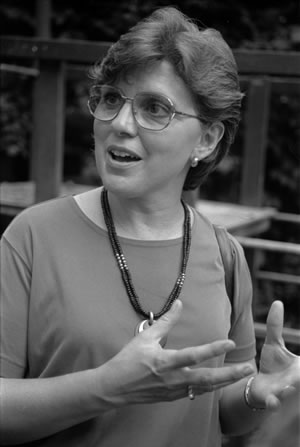Rachel Yoder
Rachel Yoder has been instrumental in desegregating 36 public elementary schools in Fort Wayne, Indiana, improving the education for 20,000 children.
Rachel grew up in an Amish and Mennonite farming community in the Appalachian Mountains of western Maryland. “In one sense, my upbringing was very isolated and sheltered—one-third of the elementary student body had the surname Yoder,” Rachel says. “At the same time, my mother’s open-minded spirit exposed me to many different people and ideas.” Graduating from college in 1972, Rachel met and married Duane Yoder, whose career as an electrical engineer took them to Fort Wayne, Indiana, in 1979. The Yoders adopted a racially diverse family and deliberately bought a home in an integrated neighborhood. When their daughter, Christina, began kindergarten at an inner-city school, the Yoders were stunned at the difference between the segregated schools of the inner-city and the magnet schools of the surrounding communities.
Disturbed by this gross disparity, Rachel and other concerned community members organized a non-profit organization called Parents for Quality Education and Integration (PQEI) to work through the courts to desegregate the 36 elementary schools of Fort Wayne. They alleged that the school system and the state of Indiana had knowingly approved building plans to keep the schools segregated. Rachel recruited 40 potential plaintiffs from families from many socio-economic backgrounds who were willing to testify against the school system. Making endless rounds of phone calls for months at a time, Rachel kept everyone informed, answering questions and providing encouragement. She transported plaintiffs who needed help getting to their depositions. Her strong connections and relationships within the Fort Wayne community helped her forge links between the attorneys and the community members.
PQEI reached a settlement with the Fort Wayne Community Schools and, soon after, the school system joined PQEI in suing the state of Indiana. In 1994, the state settled its portion of the suit, agreeing to pay $12.6 million over the next 6 years. An educational improvement committee, composed of members from the school administration, the business community, and PQEI, was formed to allocate the funds. As a member of the committee, Rachel worked with others to spend the money in a way that would create a legacy once the money was gone. Since 1994, part of the $12.6 million has been spent on staff development, part on a comprehensive diversity initiative, a portion on training in conflict resolution and a portion on early childhood programs. State funds will run out in the year 2000, but innovative reading programs are revolutionizing literacy levels across the city schools.
While Rachel worked with PQEI, she “feared that if we worked for desegregation, it would actually increase the burden on people in the inner-city. I talked to people who had been involved in the civil rights movement and constantly heard: ‘Yes, change is needed but we got burned before. Our only high school was closed and we were bused all over the place.’ It was important to me to ensure that the black community would not bear the burden alone. The burden would be shared so the results would be much better for everyone.”
Rachel relies on her faith to maintain a clear focus on what is important. “At the core of what I do is my belief that I am called to working for peace and justice, and to value and respect all people.” Her integrated faith community provides her with support and encouragement. Helen Brown, a civil rights activist, advised her that only people who were willing to be in for the long haul should get involved in the desegregation work. Rachel took her advice to heart, making the persistent commitment the case required.
Since the settlement of the PQEI lawsuit, people from other counties have been moving into the city to attend city schools. Annual school fairs educate parents about the greater variety and choice in the local schools. Businesses and ministerial alliances have been supporting Central City schools. “There was definitely a group of people who didn’t want integration to happen and were opposed to any kind of busing,” explains Rachel Yoder. “Now I seldom hear anyone mention busing. Most people just see this as a good thing.”
 Photo by Dorothea von Haeften
Photo by Dorothea von Haeften